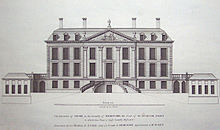
| This article includes a list of general references, but it lacks sufficient corresponding inline citations. Please help to improve this article by introducing more precise citations. (May 2014) (Learn how and when to remove this message) |
Thomas Foley, 1st Baron Foley (8 August 1716 – 18 November 1777), was a British landowner and politician.
Early life
Foley was the son of Thomas Foley MP and his wife Hester (née Andrews) Foley and was educated at Westminster School (1724–732) and Trinity College, Cambridge (from 1732). The Foley family descended from the prominent ironmaster Thomas Foley.
Career
He succeeded his father in 1749, inheriting the Stoke Edith estate in Herefordshire. Foley was also the cousin, namesake and heir of Thomas Foley, 2nd Baron Foley (a title which became extinct on the latter's death in 1766), thus also inheriting Witley Court and the extensive Great Witley estate. This included ironworks at Wilden and Shelsley Walsh, which were leased about at the end of his life.

He was elected to the House of Commons for Droitwich in 1741, a constituency he represented until 1746 and again from 1754 to 1768, followed by election to represent Herefordshire between 1768 and 1776. The latter year the title previously held by his cousin was revived when Foley was raised to the peerage as Baron Foley of Kidderminster in the County of Worcester.
Personal life
Lord Foley married Grace (d. 1769), daughter of George Granville, 1st Baron Lansdowne, in 1740. They had seven children:
- Thomas Foley, 2nd Baron Foley (1742–1793), to whose family he devised the Great Witley estate.
- Hon. Grace Foley (1743–1813), who married James Hamilton, 2nd Earl of Clanbrassil, in 1774.
- Hon. Edward Foley (1747–1803), to whose family he devised his paternal Stoke Edith estate.
- Hon. Andrew Foley (c. 1748–1816), to whose family he devised the Newent estate.
- Hon. Anne Foley (d. 1794), who married Sir Edward Winnington, 2nd Baronet in 1776.
- Hon. Elizabeth Foley (c. 1769–1776)
- Hon. Mary Foley (d. 1844), who married Richard Clerk.
Foley died in November 1777, aged 61. He was succeeded in the barony by the eldest son, Thomas.
References
- "FOLEY, Thomas (1716-77), of Stoke Edith, Herefs. and Witley, Worcs". History of Parliament. Retrieved 9 January 2018.
- Kidd, Charles, Williamson, David (editors). Debrett's Peerage and Baronetage (1990 edition). New York: St Martin's Press, 1990.
- Will of 1st Lord Foley
- www.thepeerage.com
- Leigh Rayment's Peerage Pages
| Parliament of Great Britain | ||
|---|---|---|
| Preceded byThomas Winnington Edward Foley |
Member of Parliament for Droitwich 1741–1747 With: Thomas Winnington 1741–1742 Lord George Bentinck 1742–1747 Francis Winnington 1747 |
Succeeded byFrancis Winnington Edwin Sandys |
| Preceded byFrancis Winnington Edwin Sandys |
Member of Parliament for Droitwich 1754–1768 With: Robert Harley |
Succeeded byRobert Harley Edward Foley |
| Preceded byVelters Cornewall Thomas Foley |
Member of Parliament for Herefordshire 1768–1776 With: Thomas Foley 1768–1774 Sir George Cornewall 1774–1776 |
Succeeded bySir George Cornewall Thomas Harley |
| Peerage of Great Britain | ||
| New creation | Baron Foley 2nd creation 1776–1777 |
Succeeded byThomas Foley |
- 1716 births
- 1777 deaths
- People from Malvern Hills District
- People educated at Westminster School, London
- Alumni of Trinity College, Cambridge
- Peers of Great Britain created by George III
- Politicians from Worcestershire
- Politics of Herefordshire
- English ironmasters
- 18th-century English businesspeople
- Members of the Parliament of Great Britain for English constituencies
- British MPs 1741–1747
- British MPs 1754–1761
- British MPs 1761–1768
- British MPs 1768–1774
- British MPs 1774–1780
- Foley family
- Barons Foley (1776 creation)